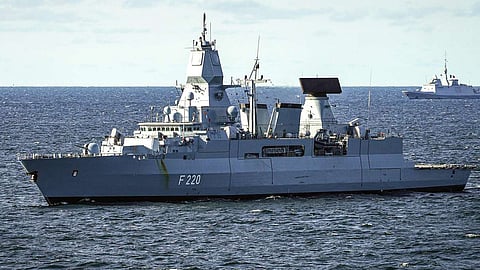Germany: Russian attack not expected amid Zapad drills
Germany does not expect Russian attacks on NATO territory under the cover of Moscow's Zapad military exercises that are set to kick off in two weeks, Germany's defence chief Carsten Breuer said on Monday.
The scheduled "Zapad-2025" (West-2025) drills, to be held in western Russia and Belarus, have raised security concerns in neighbouring NATO member states Poland, Lithuania and Latvia.
"We don't have any indication that preparations for an attack are being made under the cover of the exercise. But we will be on our guard, not just German forces, but NATO (as a whole)," Breuer told reporters in Berlin.
Ukraine, which is seeking further Western military aid to help it fight Russia's full-scale invasion, has warned neighbouring Belarus over the joint Belarus-Russian drills.
"The build-up of Russian troops on the borders of Ukraine in 2021-22 took place under the cover of the joint military exercises of Russia and Belarus 'Zapad-2021'. We warn Minsk against reckless provocations," the Ukrainian foreign ministry in Kyiv said on social media in August.
Belarus President Alexander Lukashenko has dismissed the idea that Minsk would utilise the exercises to attack its neighbours as "complete nonsense".
The Zapad-2025 exercises will include drills on the possible use of nuclear weapons and the Russian-made, intermediate-range hypersonic Oreshnik missile, according to the Belarus defence minister.
Breuer said the Zapad drills would partially overlap with the Quadriga exercises Germany is holding with 13 other Western countries at the moment, involving more than 8,000 soldiers, 30 aircraft, 40 vessels in the Baltic Sea, and some 1,800 vehicles.
The Quadriga drills are meant to train for deployments of troops and weapons by sea, air and ground to Lithuania, a small Baltic nation squeezed between Belarus and the Russian Baltic enclave of Kaliningrad. Lithuania is linked to NATO's mainland only by a narrow corridor known as the Suwalki Gap.
"We want to deter, we don't want an escalation. We are exclusively training for defence...Moscow uses Zapad to stoke insecurity, among other things," said Breuer, referring to the drills Russia stages every four years.
"We expect, on the Russian side, 13,000 troops in Belarus, with another 30,000 troops training in Russia."
In any conflict with Russia, Germany would serve as a staging area and logistics hub, meaning it would need to host more than 100,000 NATO troops expected to cross the country on their way to NATO's eastern flank, as well as protect bases and ports such as Bremerhaven and Rostock.
In the Baltic Sea, the Quadriga drills will focus on the area between the German port of Rostock, which is also the base of the country's navy command, and the Lithuanian port of Klaipeda, according to Navy Chief Jan Christian Kaack.
(Reporting by Sabine Siebold; editing by Ludwig Burger and Mark Heinrich)


